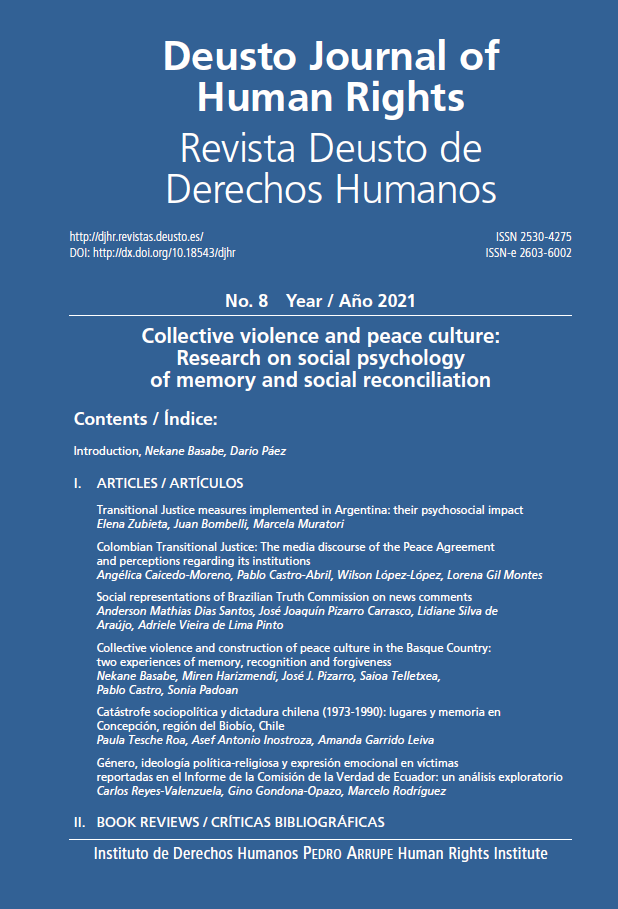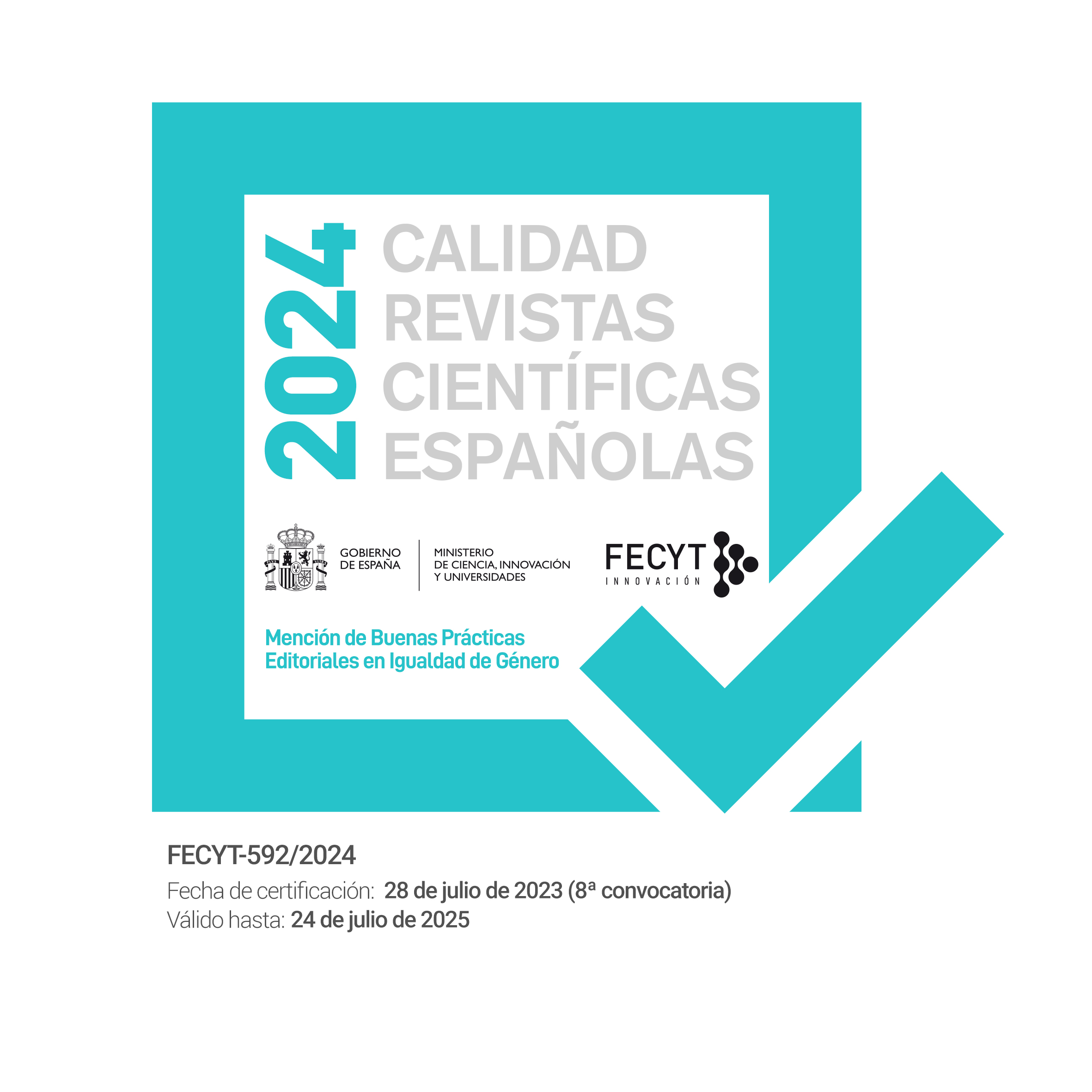Colombian Transitional Justice: The media discourse of the Peace Agreement and perceptions regarding its institutions
Abstract
Colombia had the longest internal armed conflict in Latin America, and its government reached a peace agreement with the FARC guerrillas in 2016. This article explores the transitional justice social representations during the signing of the peace agreement (study 1) and their implementation, during 2019-2020 (study 2). The first study analyzes the news related to the institutions created from the peace agreement during 2016. The second study explores different psychosocial variables associated with its two most controversial institutions, the Truth Commission (TC) and the Special Jurisdiction for Peace (JEP) during 2019-2020, after the beginning of its work. The findings revealed that news articles from two principal Colombian newspapers illustrate two anchoring categories of transitional justice with an emphasis on victims, while the political position of the newspaper suggests possible disagreements on what peace entails. Surveys showed that political position and victimization are crucial for the approval and support of the TC and the JEP, as well as correlated with the level of media consumption regarding these institutions.
Received: 17 September 2021
Accepted: 15 November 2021
Downloads
References
Allum, Nick. 1998. «A social representations approach to the comparison of three textual corpora using alceste.» Dissertation, University of London.
Alarcón, Oscar. 2020. «El Espectador cumplió 133 años de fundado: La difícil vida de un diario.» El Espectador, March 31. Accessed 09-24-2021. https://www.elespectador.com/entretenimiento/cine-y-tv/el-espectador-cumplio-133-anos-de-fundado-la-dificil-vida-de-un-diario-article-912263/.
Alzate, Mónica, and Marcos Dono. 2017. «Reconciliación social como estrategia para la transformación de los conflictos socio-políticos. Variables asociadas e instrumentos de medición.» Universitas Psychologica 16, no. 3: 1-10. https://doi.org/10.11144/javeriana.upsy16-3.rset.
Arnoso, Maitane, Manuel Cárdenas, Darío Páez y Carlos Martín Beristain. 2014. «Paraguay: De las violaciones a los derechos humanos a la justicia transicional.» Salud & Sociedad 5, no. 1: 98-114. https://www.redalyc.org/articulo.oa?id=439742474006.
Arnoso, Maitane, Darío Páez, Manuel Cárdenas, Elena Zubieta, Agustín Espinosa, and Marian Bilbao. 2015. «Representaciones sociales del pasado y rituales de justicia transicional en América Latina.» Cadernos de Pesquisa 45, no. 156: 276-98. https://doi.org/10.1590/198053143134.
Bar-Tal, Daniel. 2011. Intergroup conflicts and their resolution: a social psychological perspective. New York: Psychology Press.
Bohigues, Asbel, José Manuel Rivas, and Sergio García. 2021. «Elite support for peace agreements: evidence from Colombia.» Peacebuilding, 1-19. https://doi.org/10.1080/21647259.2021.1956751.
Buckley-Zistel, Susanne, Koloma T. Beck, Christian Braun, and Friederike Mieth. 2015. Transitional Justice Theories. London: Routledge.
Camargo, Brigido V., and Andréa B. Bousfield. 2009. «Social representations, risk behaviors and AIDS.» The Spanish Journal of Psychology 12, no. 2: 565-75. https://doi.org/10.1017/s1138741600001931.
Cárdenas, Manuel, Elena Zubieta, Darío Páez, Maitane Arnoso, and Agustín Espinosa. 2016. «Determinants of approval of the work of Truth Commissions in the Southern Cone: A comparative study.» Revista de Psicología Social 31, no. 3: 423-62. https://doi.org/10.1080/02134748.2016.1190127.
Editorial. 2018 «Motivos De Un Respaldo a Iván Duque.» El Tiempo. El Tiempo, June 9. https://www.eltiempo.com/opinion/editorial/motivos-de-un-respaldo-a-ivan-duque-228530.
El Espectador. 2021. «Colombia +20: Noticias del conflicto armado en Colombia, procesos de paz y la Jep.» ELESPECTADOR.COM. Accessed November 12, 2021. https://www.elespectador.com/colombia-20/.
Espinosa, Agustín, Darío Páez, Tesania Velázquez, Rosa Mª Cueto, Evelyn Seminario, Salvador Sandoval, Félix Reátegui, and Iris Jave. 2016. «Between remembering and forgetting the years of political violence: Psychosocial impact of the Truth and Reconciliation Commission in Peru.» Political Psychology 38, no. 5: 849-66. https://doi.org/10.1111/pops.12364.
Flores, Thomas E., and Juan F. Vargas. 2018. «Colombia: Democracy, violence, and the peacebuilding challenge.» Conflict Management and Peace Science 35, no. 6: 581-86. https://doi.org/10.1177/0738894218787786.
Forbes. 2020. «Millonarios Colombia 2020.» Forbes Colombia, July 8, 2020. https://forbes.co/millonarios-colombia-2020/.
Fundación Paz y Reconciliación. 2019. Más sombras que luces. La seguridad en Colombia a un año del gobierno de Iván Duque. Bogotá, Colombia. https://pares.com.co/wp-content/uploads/2019/08/Que%CC%81-paso%CC%81-con-la-seguridad-a-un-an%CC%83o-de-Duque-final-_compressed-Final.pdf
Galtung, Johan. 1969. «Violence, peace, and peace research.» Journal of Peace Research 6, no. 3: 167-91. http://www.jstor.org/stable/422690
Gluecker, Andreas, Andrea Correa-Chica, and Wilson López-López. 2021. «The FARC in Colombia: Collective reintegration and social identity transformation.» Political Psychology. https://doi.org/10.1111/pops.12765.
Grajales, Gloria M., and Javier O. Martínez. 2020. «Tendencias, trayectorias y relaciones de poder en el discurso de construcción de paz en el periódico El Espectador (Colombia).» El Ágora USB 20, no. 1. 112-29. https://doi. org/10.21500/16578031.4184.
Gutiérrez-Romero, Mario F., Wilson López-López, and Luis M. Silva. 2020. «Preferencia hacia la justicia restaurativa y retributiva y su relación con el nivel de competencia Moral.» Suma Psicológica 27, no. 2. https://doi.org/10.14349/sumapsi.2020.v27.n2.5.
Gutiérrez-Romero, Mario Fernando, Wilson López-López, Alejandra Orjuela- García, and Andrea Escobar-Altare. 2021. «Representaciones sobre la justicia: Un estudio comparativo en escolares colombianos.» Revista de Psicología 39, no. 2: 655-86. https://doi.org/10.18800/psico.202102.006.
Igartua, Juan José. 2011. «Comunicación mediática, persuasión narrativa y educación para la paz.» In Superando La Violencia Colectiva y Construyendo Cultura De Paz, edited by Darío Páez, Carlos Martín- Beristain, José Luis González, Nekane Basabe, and Joseph de Rivera, 631-68. Madrid: Fundamentos.
Kajsiu, Blendi. 2019. «The Colombian Right: The political ideology and mobilization of Uribismo.» Canadian Journal of Latin American and Caribbean Studies 44, no. 2: 204-24. https://doi.org/10.1080/08263663.2019.1581495.
Kelman, Herbert C., Philip Mattar, and Neil Caplan. 2018. Transforming the Israeli-Palestinian Conflict: From Mutual Negation to Reconciliation. London: Routledge.
Klein, Olivier, and Laurent Licata. 2003. «When group representations serve social change: The speeches of Patrice Lumumba during the Congolese decolonization.» British Journal of Social Psychology 42, no. 4: 571-93. https://doi.org/10.1348/014466603322595284.
Jurisdicción Especial para la Paz. 2019. «Sistema integral de verdad, justicia, reparación y no repetición (SIVJRNR)». Accessed September 10, 2021. https://www.jep.gov.co/Infografas/SIVJRNR_ES.pdf
Lambourne, Wendy. 2009. «Transitional justice and peacebuilding after mass violence.» International Journal of Transitional Justice 3, no. 1: 28-48. https://doi.org/10.1093/ijtj/ijn037
Leshem, Oded A. 2017. «What you wish for is not what you expect: Measuring hope for peace during intractable conflicts.» International Journal of Intercultural Relations 60: 60-66. https://doi.org/10.1016/j.ijintrel.2017.06.005
Leshem, Oded A., and Eran Halperin. 2020. «Lay theories of peace and their influence on policy preference during violent conflict.» Proceedings of the National Academy of Sciences 117, no. 31: 18378-84. https://doi.org/10.1073/pnas.2005928117
López-López, Wilson, and José M. Sabucedo. 2007. «Culture of peace and mass media.» European Psychologist 12, no. 2: 147-55. https://doi.org/10.1027/1016-9040.12.2.147
López-López, Wilson, José M. Sabucedo-Cameselle, Idaly Barreto, Yeny Serrano, and Henry Borja. 2014. «Discourse as a strategy for the construction of peace cultures.» In Psychosocial Approaches to Peace- Building in Colombia, edited by Stella Sacipa-Rodriguez and Maritza Montero, 1st ed., 111-120. City: New York. Springer.
López-López, Wilson. 2017. «Contribuciones de psicología de la paz: una perspectiva multidimensional.» Innovación y Ciencia XXIV, no. 1: 100-108. https://innovacionyciencia.com/revistas_pdf/2017-1.pdf
López-López, Wilson, Claudia Pineda-Marín, Andrea Correa-Chica and Camilo Rincón-Ungaro. 2021. «Psychology of peace: findings and challenges for the multidimensional transformation of violent social practices.». In Political Psychology in Latin America, edited by Claudia Zuñiga and Wilson López-López, 1st ed., 131-50. Washington DC: American Psychological Association. https://doi.org/10.1037/0000230-007
Martín-Beristain, Carlos, Darío Páez, Bernard Rimé, and Patrick Kanyangara. 2010. «Psychosocial effects of participation in rituals of transitional justice: A collective-level analysis and review of the literature of the effects of Trcs and trials on human rights violations in Latin America.» Revista de Psicología Social 25, no. 1: 47-60. https://doi.org/10.1174/021347410790193450
Matanock, Aila M., and Miguel García-Sánchez. 2017 «The Colombian paradox: peace processes, elite divisions & popular plebiscites.» Daedalus 146, no. 4: 152-66. https://doi.org/10.1162/daed_a_00466.
Mathias, Anderson, Darío Páez, Agustín Espinosa, Salvador Sandoval, Carolina Alzugaray, Maitane Arnoso, Manuel Cárdenas et al. 2020. «The association between Truth Commissions evaluation, emotional climate and institutional trust: comparison and meta-analysis of surveys in six South American Countries.» International Journal of Social Psychology 35, no. 2: 203-45. https://doi.org/10.1080/02134748.2020.1721053.
Paluck, Elizabeth. 2009. «Reducing intergroup prejudice and conflict using the media: A field experiment in Rwanda.» Journal of Personality and Social Psychology 96, no. 3: 574-587. https://doi.org/10.1037/a0011989
Reinert, Max. 1996. Alceste (Version 3.0). Toulouse: Images. Reinert, Max. 1993. «Les ‘Mondes Lexicaux’ Et Leur ‘Logique’ à Travers
L’analyse Statistique D’un Corpus De Récits De Cauchemars.» Langage & société 1, 66: 5-39. https://www.persee.fr/doc/lsoc_0181-4095_1993_num_66_1_2632
Reinert, Max. 1990. «Alceste Une Methodologie D’analyse Des Donnees Textuelles Et Une Application: Aurelia De Gerard De Nerval.», Bulletin De Méthodologie Sociologique 26: 24-54. Accessed September 10, 2021. http://www.jstor.org/stable/24362247
Reinert, Max A. 1983. «Une méthode de classification descendante hiérarchique: Application à l’analyse lexicale par contexte.» Les Cahiers de l’Analyse des D onnées 2, no. 8: 187-98.
Rettberg, Angelika, and Juan E. Ugarriza. 2016. «Reconciliation: A comprehensive framework for empirical analysis.» Security Dialogue 47, no. 6: 517-40. https://doi.org/10.1177/0967010616671858
Rimé Bernard. 2012. La compartición social de las emociones. Bilbao: Desclée de Brouwer. https://www.edesclee.com/img/cms/pdfs/9788433025777.pdf
Rincón-Unigarro, Camilo, Andrea Correa-Chica, Wilson López-López, María Morales-Sierra, and Sara Rivera-Escobar. 2020. «Encuadres mediáticos del perdón y reconciliación en el contexto del conflicto armado colombiano.» Revista Colombiana de Psicología 29, no. 1: 105-23. https://doi.org/10.15446/v29n1.81505.
Staub, Ervin.2012. «Genocide, mass kil l ing, and violent conflict: Prevention and reconciliation.» In The Oxford Handbook of Intergroup Conflict, edited by Linda R. Tropp, 1st ed., 309-27. Oxford: Oxford University Press, https://www.oxfordhandbooks.com/view/10.1093/oxfordhb/9780199747672.001.0001/oxfordhb-9780199747672-e-16
Tellez, Juan Fernando. 2018. «Worlds apart: Conflict exposure and preferences for peace.» Journal of Conflict Resolution 63, no. 4: 1053-76. https://doi.org/10.1177/0022002718775825
Trejos, Luis F. 2013. «Colombia: Una revisión teórica de su conflicto armado.» Revista Enfoques 18, XI: 55-75.
Wohl, Michael J.A., and Nyla R. Branscombe. 2005. «Forgiveness and collective guilt assignment to historical perpetrator groups depend on level of social category inclusiveness.» Journal of Personality and Social Psychology 88, no. 2: 288-303. https://doi.org/10.1037/0022-3514.88.2.288
Velez, Gabriel, Gabriel Twose, and Wilson López-López. 2020. «Human rights and reconciliation: theoretical and empirical connections.» In The Cambridge Handbook of Psychology and Human Rights, edited by Neal S. Rubin and Roseanne L. Flores, 537-52. Cambridge: Cambridge University Press. doi: https://doi.org/10.1017/9781108348607.037
Deusto Journal of Human Rights / Revista Deusto de Derechos Humanos is an Open Access journal; which means that it is free for full and immediate access, reading, search, download, distribution, and reuse in any medium only for non-commercial purposes and in accordance with any applicable copyright legislation, without prior permission from the copyright holder (University of Deusto) or the author; provided the original work and publication source are properly cited (Issue number, year, pages and DOI if applicable) and any changes to the original are clearly indicated. Any other use of its content in any medium or format, now known or developed in the future, requires prior written permission of the copyright holder.



3.jpg)
3.jpg)
3.jpg)
.jpg)








